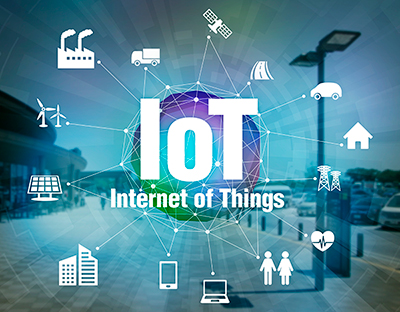BY DENNY FISHER, Chief strategist, ACS
Each day individuals and businesses use technology and the internet to run their lives and businesses more efficiently.
The overall term for this is the “Internet of Things.” It includes everyday objects that are embedded with network connectivity, electronics, software or sensors with the ability to send and receive data. More and more “smart” devices are communicating with each other. This extends beyond what one might generally think when it comes to information technology and includes everyday objects that are embedded with network connectivity, electronics, software or sensors; thus they send and receive data. This will allow the gathering, measuring and analysis of data from any object on the internet.
There were 25 billion devices connected to the internet in 2015. By 2020, that number will skyrocket to at least 50 billion; some experts cite a 200 percent increase. Either way, it is a huge increase in devices to prepare for.
This ranges from businesses that control their electricity consumption to those that monitor the gas consumption within their vehicle fleets. The everyday person uses the Internet of Things when he or she uses home automation to externally adjust the temperature of the house, or checks to see whether the lights are off and the doors and windows are locked.
This data is important to businesses because it can help them operate more efficiently to save time and money, said Ryan Weston, the manager of security and connectivity for Associated Computer Systems Ltd.
Because there are a growing number of devices in corporate networks, some companies have not taken the time to securely configure them in order to protect themselves from potential security attacks. About 70 percent of businesses say they are not prepared for the security risks associated with the Internet of Things.
“Recent hacking events have shown just how important it is to keep this data secure at all times,” Weston said.
“Businesses will need to harness an explosion of IoT data to generate real-time insights that will guide improving business processes,” Weston added.
On Oct. 21, 2016, there was a distributed denial-of-service (DDoS) attack that crashed popular widely used websites. These attacks find security vulnerabilities in popular Internet of Things devices and exploit them in an attempt to see how far they can tap into a network. In the case of the October DDoS attack, hackers took control of devices such as baby monitors, thermostats, routers, programmable logic controllers and other items that they then used to overload servers and cause websites to crash.
These types of attacks show the dangers of unprotected data and insecure systems, Weston said. If hackers can tap into a cyber network and slow down the internet, they may also be able to target companies for their data. A hack of this nature would be dangerous. For example, if a hacker attacked a chemical manufacturing company through an IoT-enabled device, he could potentially change the chemical composition of the company’s product unbeknownst to the manufacturer or the consumer.

A security assessment can ensure a business’s Internet of Things devices are secure in order to prevent breaches and hacks of information. There are other steps that can be taken to secure devices. These include:
- Disabling any built-in remote access backdoors that are not being used.
- Including IoT devices in information technology plans, and ensuring policies are in place to ensure their security.
- Changing the default password on devices, and creating passwords that are unique to the individual and contain a combination of upper- and lowercase letters, punctuation, symbols and numbers. Some of the strongest passwords are short sentences that are unique to the user but easy for him or her to remember — password length is key, Weston said.
Each month this blog will feature information about how the Internet of Things can affect all areas of business. In the coming months, it will explore how to store and utilize data to improve one’s business, more information about securing data, and how to set up an appropriate network and manage devices within it.
 |
Denny Fisher, Chief Strategist View Bio 515-223-0078 contact@acsltd.com acsltd.com/br |

